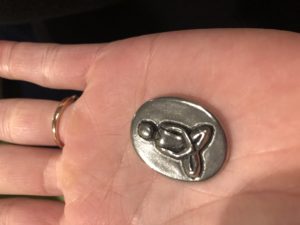As Henry Ford has famously said, “Whether you think you can or think you can’t, you’re right.” This quote is hands down one of my favorites because it simply, yet so accurately captures the power that the mind and our thoughts have over our actions and behaviors.
In the coaches’ book club I recently finished Grit. It may be my third time reading it, but I find something new each and every time I go through it. During this last read what stood out to me the most was her chapter on Hope.
Research experiments in the 1960s discovered that suffering without control reliably produces symptoms of clinical depression, including changes in appetite and physical activity, sleep problems, and poor concentration.
During the day I work at a day-treatment program facilitating therapuetic activities with middle schoolers. Many of the kids I work with have at least one or several of the above-mentioned struggles. This is probably why this chapter was so fascinating to me.
In today’s society, we understand that our thoughts have a major impact on our behaviors. That is essentially what drives our behavior at times. However, in the 1960s this idea sounded absurd to most. What was thought to drive behavior was punishments and rewards. Since people can essentially learn to be helpless, we can also learn to be optimistic. Both of these terms are referred to as learned helplessness and learned optimism. A lot of this research started with two first-year psychology doctoral students named Marty Seligman and Steve Maier.

Let’s go through a study Marty Seligman conducted to understand our pessimistic or optimistic mindsets.
Imagine: You can’t get all the work done that others expect of you. Now imagine one major cause for this event. What leaps to mind?
Now think about what your immediate response would be to this scenario. When I did this exercise my immediate thought was, “I must have overscheduled myself again.”
According to Seligman’s research, a pessimist might say, “I screw everything up.” Or, “I’m a loser.” A pessimist answer is something permanent, where you can’t do much to change the cause.
On the flip side, an optimist may have answered, “I mismanaged my time.” Or, “I didn’t work efficiently because of distractions.” These answers are different because they are all temporary, specific, and able to be fixed.
From this study, Seligman was able to confirm that pessimists are more likely to suffer from depression and anxiety compared to optimists. How did you answer? If it was a pessimist answer, do not worry. It does not mean that you are automatically going to become diagnosed with depression and anxiety. It does, however, mean that you are at a higher risk if you do not put in the effort to change your mindset.
How does this also apply to sport? Well, pessimists are also more likely to quit and give in sooner than optimists. If a performance doesn’t go as expected, optimists are more likely to try yet again. It also can be really damaging to athletes who endure an injury if they have a pessimist mindset over an optimstic one. As coaches or an athlete yourself we want to keep pushing and keep trying despite setbacks. If you are naturally a pessimist or you have a team full of pessimists, how are you able to overcome this?
The answer is feeling like you have a sense of control. Cognitive behavioral therapy has demonstrated that we can, in fact, learn to recognize and be aware of our negative self-talk and change our maladaptive behaviors. We can learn to interpret what is happening to us in a different way as an optimist would.
As the book GRIT discussed in chapter 9 Hope, what doesn’t kill us can make us stronger, but it also can make us weaker. Steve Maier conducted a study similar to one he conducted with Marty Seligman but with a few changes, he used adolescent rats to determine learned helplessness vs. learned optimism and compared these rats later on when they reached adulthood.
What he found was that when we experience adversity, or some kind of trauma, that we overcome on our own during youth, you develop a different way of dealing with adversity later on. These findings suggest that telling someone to overcome adversity is not enough. They have to actually experience mastery at the same time as adversity. Many kids start to view themselves as helpless because they are not learning, “I can do this. I can succeed in that,” through mastery experiences and instead have more helplessness experiences.
As coaches, it is your duty to provide mastery experiences for your athletes and teams. This can be done by providing opportunities to make several successful plays after a challenging loss or mistake. As an athlete, you need to understand that there’s a contingency between your actions and what happens to you. We all must remind ourselves, and those around us that if we do something, then something will happen.
“It isn’t suffering that leads to hopelessness. It’s suffering you think you can’t control.” – GRIT
If we can feel that we have some sense of control over what happens to us through our actions, then we are more likely to experience mastery and foster a optimistic mindset.







